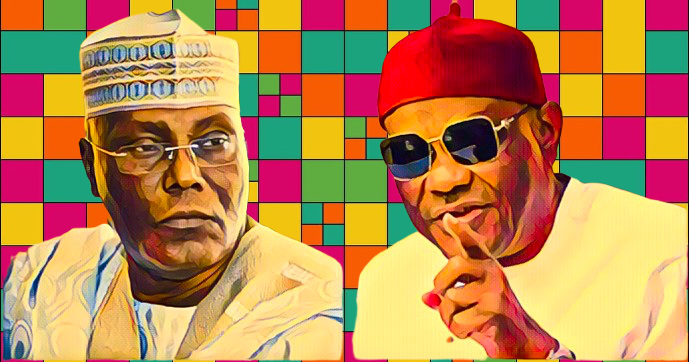The Peoples Democratic Party (PDP) of Nigeria is set for a crucial moment as it convenes for its 98th National Executive Committee (NEC) meeting. This gathering follows closely on the heels of the party’s national caucus and Board of Trustees (BoT) meetings. Amid internal discord and political jockeying, the PDP’s NEC meeting is set to address a myriad of critical issues, including leadership struggles, party unity, and future electoral strategies.
Internal Strife and Leadership Battles
The NEC meeting is anticipated to be a battleground where factions led by notable figures such as the party’s 2023 presidential candidate, Atiku Abubakar, and the Minister of the Federal Capital Territory, Nyesom Wike, will vie for influence. This internal power struggle comes at a time when the party is trying to navigate its path forward after the resignation of its former National Chairman, Iyorchia Ayu, which has left a significant leadership vacuum.
The dynamics within the PDP have been particularly strained following a contentious caucus meeting that ended in disarray over discussions about the potential expulsion of Wike and the retention of the acting national chairman, Illiya Damagum. This discord has only intensified as various party camps solidify their positions before the NEC meeting.
Governors’ Influence and the Quest for Control
Governors elected under the PDP banner are reportedly seeking to consolidate power to influence the appointment of a new chairman. Their efforts are underscored by the financial clout they wield within the party, having been its major financiers. The recent withdrawal of Oyo State Governor Seyi Makinde from the G-5, an influential group within the party, and his subsequent efforts to unify the governors highlight the shifting alliances and power structures within the PDP.
The governors’ forum, set to meet before the NEC, is expected to articulate a position that could sway the direction of the party, independent of the dominant factions led by Atiku and Wike. This move signifies a broader attempt by the state leaders to assert their authority over the party’s future, especially as some governors nearing the end of their terms look to further their political careers beyond their governorships.
Electoral Reforms and Party Constitution
The agenda for the NEC meeting is comprehensive, with plans to address not only leadership issues but also the amendment of the party’s constitution and a review of the 2023 general elections. These discussions are crucial for recalibrating the party’s strategies and realigning its objectives to better resonate with the electorate and strengthen its operational framework.
Speculations and Anticipations
There is widespread speculation that the NEC meeting could significantly change the party’s leadership dynamics. Proposals for leadership include promoting Senator Gabriel Suswam to the national chairman position, a move supported by Atiku’s camp, which sees Suswam’s potential leadership as a way to unify and strengthen the party’s national appeal.
Conversely, the Wike-led faction supports the continuation of Damagum’s leadership, arguing that no vacancy currently exists that would warrant a change in the chairmanship, based on the party’s constitution that allows the deputy national chairman from the concerned zone to fill such gaps temporarily.
Calls for Unity and Reform
There are calls from various party members for unity and structural reform amid these internal conflicts. The PDP Loyal Group 100 percent, for example, has publicly urged Atiku to renounce his 2027 presidential ambitions as a gesture to foster party cohesion and recommended sanctions for Wike over allegations of anti-party activities.
The Broader Political Landscape
As the PDP navigates these tumultuous waters, the outcomes of the NEC meeting could very well dictate the party’s capacity to serve as a formidable opposition and its potential to regain power in future elections. The expectation set by party elders, like former Senate President Adolphus Wabara, is to emerge from the NEC meeting stronger and more united, ready to confront the challenges that lie ahead and potentially reclaim national leadership in the 2027 elections.
In conclusion, the PDP’s upcoming NEC meeting is not just a routine gathering; it is a critical juncture that will determine the trajectory of Nigeria’s main opposition party. The decisions made will have lasting implications on its structural integrity, leadership, and overall strategy moving forward, shaping how it contends with internal schisms and positions itself on the national stage.



